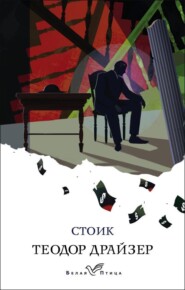По всем вопросам обращайтесь на: info@litportal.ru
(©) 2003-2024.
✖
The Financier / Финансист. Книга для чтения на английском языке
Настройки чтения
Размер шрифта
Высота строк
Поля
“Frank Cowperwood, son of the teller of the Third National Bank,” replied the boy, decisively.
“Oh, yes,” said the man, fixed by his glance.
“Will you wait while I run up to the bank and get the money?”
“Yes. Don’t be gone long. If you’re not here in an hour I’ll sell it again.”
Young Cowperwood made no reply. He hurried out and ran fast; first, to his mother’s grocer, whose store was within a block of his home.
Thirty feet from the door he slowed up, put on a nonchalant air, and strolling in, looked about for Castile soap. There it was, the same kind, displayed in a box and looking just as his soap looked.
“How much is this a bar, Mr. Dalrymple?” he inquired.
“Sixteen cents,” replied that worthy.
“If I could sell you seven boxes for sixty-two dollars just like this, would you take them?”
“The same soap?”
“Yes, sir.”
Mr. Dalrymple calculated a moment.
“Yes, I think I would,” he replied, cautiously.
“Would you pay me to-day?”
“I’d give you my note for it. Where is the soap?”
He was perplexed and somewhat astonished by this unexpected proposition on the part of his neighbor’s son. He knew Mr. Cowperwood well – and Frank also.
“Will you take it if I bring it to you to-day?”
“Yes, I will,” he replied. “Are you going into the soap business?”
“No. But I know where I can get some of that soap cheap.” He hurried out again and ran to his father’s bank. It was after banking hours; but he knew how to get in, and he knew that his father would be glad to see him make thirty dollars. He only wanted to borrow the money for a day.
“What’s the trouble, Frank?” asked his father, looking up from his desk when he appeared, breathless and red faced.
“I want you to loan me thirty-two dollars! Will you?”
“Why, yes, I might. What do you want to do with it?”
“I want to buy some soap – seven boxes of Castile soap. I know where I can get it and sell it. Mr. Dalrymple will take it. He’s already offered me sixty-two for it. I can get it for thirty-two. Will you let me have the money? I’ve got to run back and pay the auctioneer.”
His father smiled. This was the most businesslike attitude he had seen his son manifest. He was so keen, so alert for a boy of thirteen.
“Why, Frank,” he said, going over to a drawer where some bills were, “are you going to become a financier already? You’re sure you’re not going to lose on this? You know what you’re doing, do you?”
“You let me have the money, father, will you?” he pleaded. “I’ll show you in a little bit. Just let me have it. You can trust me.”
He was like a young hound on the scent of game. His father could not resist his appeal.
“Why, certainly, Frank,” he replied. “I’ll trust you.” And he counted out six five-dollar certificates of the Third National’s own issue and two ones. “There you are.”
Frank ran out of the building with a briefly spoken thanks and returned to the auction room as fast as his legs would carry him. When he came in, sugar was being auctioned. Hemade his way to the auctioneer’s clerk.
“I want to pay for that soap,” he suggested.
“Now?”
“Yes. Will you give me a receipt?”
“Yep.”
“Do you deliver this?”
“No. No delivery. You have to take it away in twenty-four hours.”
That difficulty did not trouble him.
“All right,” he said, and pocketed his paper testimony of purchase.
The auctioneer watched him as he went out. In half an hour he was back with a drayman – an idle levee-wharf hanger-on who was waiting for a job.
Frank had bargained with him to deliver the soap for sixty cents. In still another half-hour he was before the door of the astonished Mr. Dalrymple whom he had come out and look at the boxes before attempting to remove them. His plan was to have them carried on to his own home if the operation for any reason failed to go through. Though it was his first great venture, he was cool as glass.
“Yes,” said Mr. Dalrymple, scratching his gray head reflectively. “Yes, that’s the same soap. I’ll take it. I’ll be as good as my word. Where’d you get it, Frank?”
“At Bixom’s auction up here,” he replied, frankly and blandly.
Mr. Dalrymple had the drayman bring in the soap; and after some formality – because the agent in this case was a boy – made out his note at thirty days and gave it to him.
Frank thanked him and pocketed the note. He decided to go back to his father’s bank and discount it, as he had seen others doing, thereby paying his father back and getting his own profit in ready money. It couldn’t be done ordinarily on any day after business hours; but his father would make an exception in his case.
He hurried back, whistling; and his father glanced up smiling when he came in.
“Well, Frank, how’d you make out?” he asked.
“Here’s a note at thirty days,” he said, producing the paper Dalrymple had given him. “Do you want to discount that for me? You can take your thirty-two out of that.”
His father examined it closely. “Sixty-two dollars!” he observed. “Mr. Dalrymple! That’s good paper! Yes, I can. It will cost you ten per cent.,” he added, jestingly. “Why don’t you just hold it, though? I’ll let you have the thirty-two dollars until the end of the month.”
“Oh, no,” said his son, “you discount it and take your money. I may want mine.”
His father smiled at his businesslike air. “All right,” he said. “I’ll fix it to-morrow. Tell me just how you did this.” And his son told him.
At seven o’clock that evening Frank’s mother heard about it, and in due time Uncle Seneca.
“Oh, yes,” said the man, fixed by his glance.
“Will you wait while I run up to the bank and get the money?”
“Yes. Don’t be gone long. If you’re not here in an hour I’ll sell it again.”
Young Cowperwood made no reply. He hurried out and ran fast; first, to his mother’s grocer, whose store was within a block of his home.
Thirty feet from the door he slowed up, put on a nonchalant air, and strolling in, looked about for Castile soap. There it was, the same kind, displayed in a box and looking just as his soap looked.
“How much is this a bar, Mr. Dalrymple?” he inquired.
“Sixteen cents,” replied that worthy.
“If I could sell you seven boxes for sixty-two dollars just like this, would you take them?”
“The same soap?”
“Yes, sir.”
Mr. Dalrymple calculated a moment.
“Yes, I think I would,” he replied, cautiously.
“Would you pay me to-day?”
“I’d give you my note for it. Where is the soap?”
He was perplexed and somewhat astonished by this unexpected proposition on the part of his neighbor’s son. He knew Mr. Cowperwood well – and Frank also.
“Will you take it if I bring it to you to-day?”
“Yes, I will,” he replied. “Are you going into the soap business?”
“No. But I know where I can get some of that soap cheap.” He hurried out again and ran to his father’s bank. It was after banking hours; but he knew how to get in, and he knew that his father would be glad to see him make thirty dollars. He only wanted to borrow the money for a day.
“What’s the trouble, Frank?” asked his father, looking up from his desk when he appeared, breathless and red faced.
“I want you to loan me thirty-two dollars! Will you?”
“Why, yes, I might. What do you want to do with it?”
“I want to buy some soap – seven boxes of Castile soap. I know where I can get it and sell it. Mr. Dalrymple will take it. He’s already offered me sixty-two for it. I can get it for thirty-two. Will you let me have the money? I’ve got to run back and pay the auctioneer.”
His father smiled. This was the most businesslike attitude he had seen his son manifest. He was so keen, so alert for a boy of thirteen.
“Why, Frank,” he said, going over to a drawer where some bills were, “are you going to become a financier already? You’re sure you’re not going to lose on this? You know what you’re doing, do you?”
“You let me have the money, father, will you?” he pleaded. “I’ll show you in a little bit. Just let me have it. You can trust me.”
He was like a young hound on the scent of game. His father could not resist his appeal.
“Why, certainly, Frank,” he replied. “I’ll trust you.” And he counted out six five-dollar certificates of the Third National’s own issue and two ones. “There you are.”
Frank ran out of the building with a briefly spoken thanks and returned to the auction room as fast as his legs would carry him. When he came in, sugar was being auctioned. Hemade his way to the auctioneer’s clerk.
“I want to pay for that soap,” he suggested.
“Now?”
“Yes. Will you give me a receipt?”
“Yep.”
“Do you deliver this?”
“No. No delivery. You have to take it away in twenty-four hours.”
That difficulty did not trouble him.
“All right,” he said, and pocketed his paper testimony of purchase.
The auctioneer watched him as he went out. In half an hour he was back with a drayman – an idle levee-wharf hanger-on who was waiting for a job.
Frank had bargained with him to deliver the soap for sixty cents. In still another half-hour he was before the door of the astonished Mr. Dalrymple whom he had come out and look at the boxes before attempting to remove them. His plan was to have them carried on to his own home if the operation for any reason failed to go through. Though it was his first great venture, he was cool as glass.
“Yes,” said Mr. Dalrymple, scratching his gray head reflectively. “Yes, that’s the same soap. I’ll take it. I’ll be as good as my word. Where’d you get it, Frank?”
“At Bixom’s auction up here,” he replied, frankly and blandly.
Mr. Dalrymple had the drayman bring in the soap; and after some formality – because the agent in this case was a boy – made out his note at thirty days and gave it to him.
Frank thanked him and pocketed the note. He decided to go back to his father’s bank and discount it, as he had seen others doing, thereby paying his father back and getting his own profit in ready money. It couldn’t be done ordinarily on any day after business hours; but his father would make an exception in his case.
He hurried back, whistling; and his father glanced up smiling when he came in.
“Well, Frank, how’d you make out?” he asked.
“Here’s a note at thirty days,” he said, producing the paper Dalrymple had given him. “Do you want to discount that for me? You can take your thirty-two out of that.”
His father examined it closely. “Sixty-two dollars!” he observed. “Mr. Dalrymple! That’s good paper! Yes, I can. It will cost you ten per cent.,” he added, jestingly. “Why don’t you just hold it, though? I’ll let you have the thirty-two dollars until the end of the month.”
“Oh, no,” said his son, “you discount it and take your money. I may want mine.”
His father smiled at his businesslike air. “All right,” he said. “I’ll fix it to-morrow. Tell me just how you did this.” And his son told him.
At seven o’clock that evening Frank’s mother heard about it, and in due time Uncle Seneca.

















